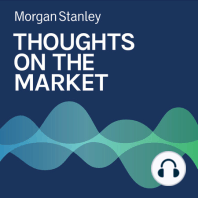4 min listen

U.S. Politics: Market Implications of the Midterm Election
U.S. Politics: Market Implications of the Midterm Election
ratings:
Length:
7 minutes
Released:
Jun 1, 2022
Format:
Podcast episode
Description
Looking back on the 2016 and 2020 elections, it is clear that elections can have a significant impact on the U.S. economic outlook. The question is whether the coming midterm elections have any meaningful implications. Head of U.S. Public Policy Research and Municipal Strategy Michael Zezas and Chief U.S. Economist Ellen Zentner discuss.-----Transcript-----Michael Zezas: Welcome to Thoughts on the Market. I'm Michael Zezas, Head of U.S. Public Policy Research and Municipal Strategy for Morgan Stanley. Ellen Zentner: And I'm Ellen Zentner, Morgan Stanley's Chief U.S. Economist. Michael Zezas: And on this special edition of the podcast, we'll be talking about the 2022 U.S. midterm elections and the potential impact on markets and the economy. It's Wednesday, June 1st, at 10 a.m. in New York. Ellen Zentner: Michael, I'm going to start us off here because 13 states have now completed their primaries ahead of the midterm elections. And as our key Beltway observer, I'd love to get your initial impressions. There's a fair amount of belief that Democrats will have a difficult time maintaining majorities in both houses of Congress and maybe some investor complacency around this sort of outcome. So what are you hearing from investors and how should they be thinking about the midterms? Michael Zezas: Yeah. I think the word complacency is the correct word to use here. I think in some ways this election hasn't gotten as much attention as it should because in prior elections there was a big macro issue at play, whether it be tax cuts and trade policy in 2016, or in 2020 whether or not another tranche of COVID stimulus aid could get approved based on the election outcome. This election, we think the outcomes will really drive more sectoral impacts. So whether or not tech regulation becomes possible or regulation around cryptocurrency, or could there be a path toward spending more money on renewables and traditional energy exploration. And then, of course, corporate taxes. And then when you couple that with polls and other items suggesting that Republicans are very likely to take control of one or more chambers of Congress, it's easy to put this issue aside and become complacent about it. But Ellen, this focus on the micro doesn't necessarily mean that the outcome doesn't matter for the macro, i.e., the U.S. economic outlook. Can we look back a bit to some prior elections and how they changed the trajectory of your economic outlook? Ellen Zentner: So, you know, I would start with 2016 where we had a Republican sweep and that led to the Tax Cut and Jobs Act being passed. It was a significant increase in the fiscal deficit and a good deal of stimulus to the economy. And so we really saw that bear out in 2017 where you already had a late cycle dynamic. At the time we called it ill timed policy, where you're throwing stimulus at the economy, when the economy doesn't really need it, you really want to do the majority of your fiscal stimulus when you're actually in a downturn. Trade policy then followed. And of course, late in 2018 started to really bite the global economy. And that's when we saw the Fed also move,v to the sidelines and start cutting rates because they saw a big slowdown in the global economy that was also hitting the U.S. economy. So fiscal policy there had both an uplifting effect and a depressing effect in the outlook. And then I would point to 2020 where the election outcome really opened the door for further fiscal stimulus related to COVID. So we had already done rounds of significant fiscal stimulus, but then in a Democratic sweep, you had two further rounds of fiscal stimulus related to COVID. And so that also had a very big effect on shaping the economy in terms of the excess savings that households were building up and the amount of excess money in the economy. And so I think those are the two best examples, of course, the two most recent examples. Michael Zezas: So a common thread between 2016 and 2020 was that the outco
Released:
Jun 1, 2022
Format:
Podcast episode
Titles in the series (100)
Andrew Sheets: A Second (and Third) Opinion for Equity Markets by Thoughts on the Market